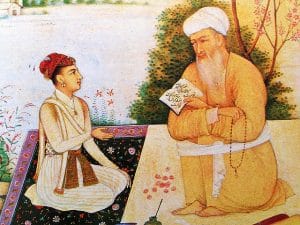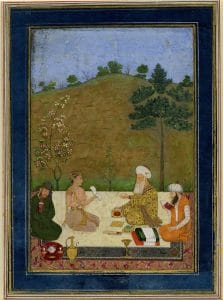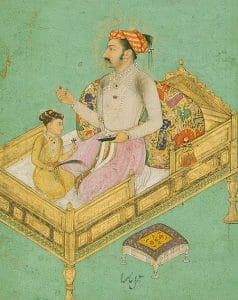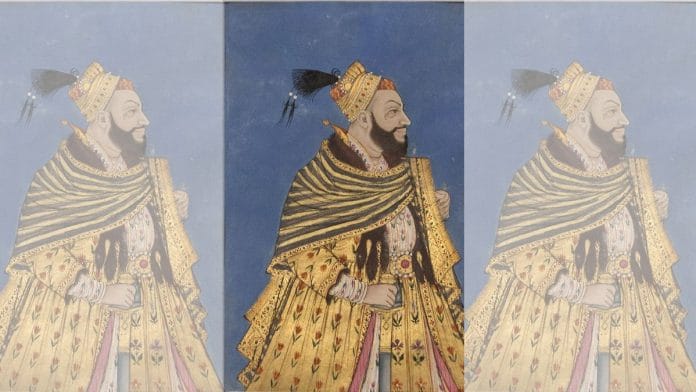If Hindu advisor Birbal was a foil to Mughal emperor Akbar, then the liberal Dara Shikoh is a counter to the fundamental orthodoxy of his brother, Emperor Aurangzeb—the good prince to the evil king.
Today, history has aggrandised the doomed prince’s quest to find harmony between Hindu thought and Muslim mysticism. But it’s not without merit.
Over the last few years, Dara has re-emerged as the toast of the town, while the remaining Mughals have been relegated to the back bench. In 2020, the Ministry of Culture under the Bharatiya Janata Party (BJP) set up a committee to find Dara’s tomb, often said to be within the Humayun Tomb complex in Delhi. In 2019, Rashtriya Swayamsevak Sangh (RSS) leaders spoke at an event organised to mark his death anniversary, where a senior functionary described him as a “real Hindustani”. The same year, Aligarh Muslim University (AMU) announced a research chair in Dara’s name. And the National Council for Promotion of Urdu Language (NCPUL) has reportedly been roped in to consolidate his works, The Economic Times reported.
He is a key figure in the sangh parivar’s narrative of Hindu-Muslim unity.
While Aurangabad was renamed Chhatrapati Sambhaji Nagar, and the Mughal Gardens at Rashtrapati Bhawan and Delhi University were renamed Amrit Udayan and Gautam Buddha Centenary Garden respectively, Dara’s name lives on. In 2017, Delhi’s Dalhousie Road was rechristened as Dara Shikoh Road in his honour.
Influenced by Mian Mir, a Sindhi Sufi saint from the Qadiri order, Dara translated the Bhagavad Gita and 52 Upanishads from Sanskrit to Persian. In his treatise, Majma-ul-Bahrain (The Mingling of the Two Oceans or The Confluence of the Two Seas), he holds forth on the similarities between Sufi and Vedantic doctrines.

Paintings show him interacting with ascetics, both Muslim and Hindu.

Many historians are of the view that if he had fulfilled his destiny and inherited the Mughal empire instead of Aurganzeb, then this land would have remained a united nation.
But a poet, writer, architect, philosopher, scholar and artist does not win the game of thrones—or in this case, the Peacock Throne. Not in a geopolitical landscape where military might and Machiavellian tactics trump good intentions. In a family where sons overthrow their fathers, where daughters are imprisoned for backing the wrong brother, and children are held hostage, it was unlikely that Dara would have ever won the throne despite his father Shah Jahan’s blessings.
Also read:
Dara’s eyes were not focused on the throne
Dara Shikoh, or Shukoh, the eldest son of Prince Khurram (later emperor Shah Jahan) and heir to the Mughal throne, was born on 20 March 1615 in Ajmer, Rajasthan, when his grandfather Jahangir was still emperor. He was no stranger to the intrigues and plotting of the Mughal court. His own father tried to rebel against Jahangir. But he failed, and Dara and Aurgangzeb were sent as hostages to Jahangir’s court to ensure Khurram toed the line.

But Dara’s eyes were not focused on the throne, write authors Rudrangshu Mukherjee, Shobita Punja and Toby Sinclair in their comprehensive tome, A New History of India: From Its Origins to the Twenty-First Century. He led his first military campaign to Kandahar when he was nearly 40 years old, which was shockingly late for the time. “That Dara Shukoh would eventually lose the succession struggle through a military encounter was an outcome that was foretold,” the authors concluded.
For all his intellectual and philosophical pursuits, the prince did little to build a power base for himself. He surely alienated the Ulema (Muslim scholars trained in Islamic law) when he declared that “paradise is there where no mullah exists”. And his pursuit of Indo-Islamic mysticism and Hindu philosophy did not endear him to the powerful Muslim nobles. Venetian traveller Niccolao Manucci, who served as an artilleryman for Dara, wrote that this was his one failing.
“They were the intermediaries of power without whom he could neither win nor exercise power,” noted historian Abraham Eraly in Emperors of the Peacock Throne: The Saga of the Great Mughals. Ignoring this power base cost him the throne—and his life.
“He was constantly in the society of brahmins, yogis and sanyasis, and he used to regard those worthless teachers of delusions as learned and true masters of wisdom,” wrote Dara’s official chronicler, Muhammad Kasim, in his records.
Also read: Dara Shukoh had a dream. And it was about Ram
Dara’s arch-nemesis was his own brother
His biggest enemy was his younger brother, Aurangzeb, whose lust for power was sharpened by years of sibling jealousy. Author Ira Mukhoty describes it as a “corrosive loathing” in her book Daughters of the Sun: Empresses, Queens and Begums of the Mughal Empire.
Shah Jahan constantly undermined Aurangzeb, who, according to Mukhoty, was a “creature of his family’s casual disdain”. In one letter, the emperor blames Dara for all his ills.
Things came to a head one day in September 1657, when Shah Jahan took ill. For several days he did not appear in court or at the Jharokha-e-Darshan (daily public appearance), and soon rumours that he was dying started to spread.
One of his sons, Shah Shuja, declared himself emperor in Bengal and marched toward Agra. Another son, Murad Baksh, who was in Gujarat, also announced he was emperor—reportedly with Aurangzeb’s support. Dara and his sister, Jahanara, were by their father’s side. In Mohaty’s account, Dara forbade couriers from travelling to prevent the information from reaching his brothers and imprisoned Aurangzeb’s vakil (personal lieutenant/representative).
But he overlooked his sister, Roshanara Begum, who was fiercely jealous of Jahanara and supported Aurangzeb. She kept him abreast of the goings on in court, and five months later, though Shah Jahan had recovered, Aurangzeb marched to Agra. He comprehensively defeated the forces of Dara Shukoh at the battle of Samugarh in June 1658, writes historian Swapna Liddle in Chandni Chowk: The Mughal City of Old Delhi.
Routed, he fled Agra, pursued by Aurangzeb’s armies. He fought several battles, but his own army was being decimated, and allies were few and far between. Dara was betrayed by a chieftain from whom he had sought help, handed over to Aurangzeb’s generals in June 1659, and brought back to Delhi.
Also read:
A tragic fall
Dara and his son were forced to wear rags, their feet were chained, and they were paraded on an elephant through the streets of Delhi. “The sight of the prince sitting abjectly with bowed head in the open howdah moved the crowd that had gathered, and there was a public outcry,” writes Liddle.
In her account, after Dara was executed, his head was brought to Aurangzeb for inspection, who then “ordered that the body be paraded once more through the streets.”
Shah Jahan named Dara after the Persian king Darius the Great. But in Persian, short vowels do not often appear in the written word, which is why Dara’s second name can be spelt as either Shikoh, which means terror or Shukhoh, which translates to majesty or grandeur. The prince who never became emperor can be remembered as ‘Of the Terror of Darius’ or ‘Of the Grandeur of Darius’.
(Edited by Zoya Bhatti)






